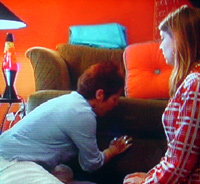

















Interview with Amber Benson
Dec 7, 2003, Offenbach
1. Magic, Multitasking and Motivation
2. Movies, television and the family
3. Being in control
4. "Chance", Sex and Power
6. Reading, Collaborating, Watching & Listening
The rhythm of the film is very elaborate – at first it keeps you on your toes, you don’t know what to expect. I thought to myself: is this a comedy, is it trying to scare me? The moment it fell into place was the scene in the car: someone forces their feelings on you and it’s claustrophobic, a frontal attack on the viewer, and you just have to laugh at that. Not in a mean way, not in a "these are idiots" sense, but: Oh yeah, I know that, when you’re stuck in the elevator with someone, emotionally speaking.
And you just can’t. Get. Out. It’s really quite funny though, because when I originally wrote it, I first of all did not write it for me to be in. I wrote it kind of thinking of other people because, you know, she’s so alien to how I go about my life. I’ m nothing like her. I’ m much more Simon. Simon is me. Like with all the counting – I’m an obsessive counter, the ceiling dots, it makes me feel connected and nice and safe to count. The countdown thing, while he waits in front of the micro-wave oven: I get bored, so it gives me something to do. And I’m constantly going: uh, do I smell funny? All the little quirks of Simon. He’s me. James is me. He really did a nice job there being me. I felt: That’s me, yeah.
And that got inserted even: The swapping of identities…
Mmh-hm, uh-huh. It was kind of weird, wasn’t it, how that worked out. I originally worked it into the script as kind of a darker moment. We just sort of did it – everything was in the script. But on the whole set, there was an air of: we’re just going to try different things. Evrybody tried things. I wanted very much to stick to the script, because I love dialogue. To me, it is the most important thing in a film.
Talking is the real action to relate to, not shootouts or… how many car chases does the average person get into?
I’ ve never been in a car chase, so that’s not my experience. Well, it was really intended to be a dark comedy. It was supposed to be very dark, and then when we started filming for some reason I casted all these people – they’re not edgy and dark, they’re very real and kind of… the characters took over. It became something completely… we started watching the dailies and people were laughing and I’ m like: hmmm. It was supposed to be funny, but not laugh-out-loud-funny, I was really shocked. You know, when you get someone like Christine Estabrook who went to Yale and comes from a very absurdist school of theatre – when you get someone like that involved, the woman is a comedic genius, and then she crawled under the couch. It was her thing. It was not in the script. People do that kind of thing: you hide, whenever something’s so overwhelming, you try to get away. You go into your cup of coffee.
What happens on the set in that moment, when someone improvises like that?
We all thought we would die. People were hitting themselves: don’t laugh, don’t laugh now. And then when it was over, we were all hysterical, because here is this woman, this adult woman crawling into the couch. And then to go from that to the scene where she is crying and upset… she watched it in the rough cut and she said: Oh no, it slows the whole thing down, I shouldn’t have been so emotional, and I’m like: what are you talking about, it’s the moment we really connect with Chance and see what she’s all about. That moment and the one with the bugs at the end, those are the two real moments when we actually have a break from the funny and get a real moment. These amazing comedic people came in and took over, and it became what I never would have envisioned, this whole sort of slapsticky thing.
Into which the Shakespeare episode fits absolutely, it’ gorgeous. That was improvised as well, I read. Because Shakespeare has this aura of classicism, but...
Yeah, it was meant for lower classes, it’s all very farcical and you know, it’s highbrow now but it was for the penny droolers in the front row to begin with.
Like Dickens.
He was serialized.
Like "Buffy". Did you know that not only is there Dickens in "Buffy" but Buffy in Dickens? The name plays a political role.
Does it?
It’s in "Bleak House", a politician’s name: the right honourable William Buffy, M.P.
I wouldn’t be surprised. Joss is an avid reader. His whole house is full of books – when I came there, it was: can I borrow that, please?
> back to top
> Part 6


